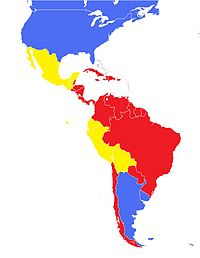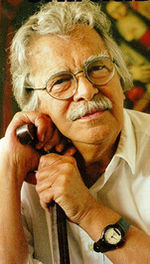- Darcy Ribeiro
-
Darcy Ribeiro (Montes Claros, Minas Gerais, Brazil, October 26, 1922 – Brasilia, DF, Brazil, February 17, 1997) was a Brazilian anthropologist, author and politician. Darcy Ribeiro's ideas of Latin American identity have influenced several later scholars of Latin American studies. As Minister of Education of Brazil he carried out profound reforms which led him to be invited to participate in university reforms in Chile, Peru, Venezuela, Mexico and Uruguay after leaving Brazil due to the 1964 coup d'état.[1]
Contents
Biography
Darcy Ribeiro was the son of Reginaldo Ribeiro dos Santos and of Josefina Augusta da Silveira. He completed his primary and secondary education in the town of his birth, Montes Claros, in Minas Gerais, at the Grupo Escolar Gonçalves Chaves and at the Ginásio Episcopal de Montes Claros. He is best known for development work in the areas of education, sociology and anthropology and for being, along with his friend and colleague Anísio Teixeira, one of the founders of the University of Brasília (Universidade de Brasília) in the early 1960s. He also served as the first rector of that university. He was the founder of the State University of Norte Fluminense (Universidade Estadual do Norte Fluminense) as well. He wrote numerous books, many of them about the indigenous populations of Brazil.
During the first mandate of governor Leonel Brizola in Rio de Janeiro (state) (1983–1987), Darcy Ribeiro created, planned and directed the implementation of the Integrated Centres for Public Instruction (Centros Integrados de Ensino Público), a visionary and revolutionary pedagogical project of assistance for children, including recreational and cultural activities beyond formal instruction – making concrete the projects envisioned decades earlier by Anísio Teixeira. Long before politicians incorporated the importance of education for the development of Brazil into their discourse, Darcy Ribeiro and Leonel Brizola had already developed these ideals.
In the elections of 1986, Ribeiro was the Democratic Labour Party PDT candidate for the governorship of Rio de Janeiro (state), running against Fernando Gabeira (at that time affiliated with the Workers’ Party PT), Agnaldo Timóteo of the Social Democratic Party (PDS) and Moreira Franco of the Brazilian Democratic Movement Party (PMDB). Riberio was defeated, being unable to overcome the high approval rating of Moreira who was elected due to the popularity of the then-recent currency reform, the Cruzado Plan (Plano Cruzado). Another defeat was in 1994, when he was Brizola's running-mate in presidential election; Darcy Ribeiro was also chief of staff (Ministro-chefe da Casa Civil) in the cabinet of President João Goulart, vice-governor of Rio de Janeiro (state) from 1983 to 1987 and exercised the mandate of senator from Rio de Janeiro from 1991 until his death – which was proceeded by a long battle with cancer that emotionally touched all of Brazilian society: Darcy Ribeiro, ever the ardent and controversial defender of his ideas, received during his long illness recognition and admiration not only from friends but also from adversaries.
Ideas and theories
 Map showing Darcy Ribeiro's classification of Latin American countries into "New Peoples" (Red), "Testimony Peoples" (Yellow) and "Transplantated Peoples" (Blue)
Map showing Darcy Ribeiro's classification of Latin American countries into "New Peoples" (Red), "Testimony Peoples" (Yellow) and "Transplantated Peoples" (Blue)
Darcy Ribeiro's ideas belonged to the evolutionist school of sociology and anthropology. He believed that peoples went though a "civilizatory process" beginning as hunter-gatherers. This "civilizatory process" was according to him marked by technological revolutions, and among these he stress the eight more important as the following:
- the agricultural revolution
- the urban revolution
- the irrigation revolution
- the metallurgic revolution
- the livestock revolution
- the mercantile revolution
- the industrial revolution
- the thermonuclear revolution
Ribeiro proposed also a classification scheme for Latin American countries where he identified "New Peoples" (Chile, Colombia, Paraguay, Venezuela etc.), that merged from the mix of several cultures; "Testimony Peoples" (Peru, Mexico, Ecuador, Guatemala and Bolivia), remnants of ancient civilizations; and Argentina and Uruguay, former "New Peoples" that became "Transplantated Peoples", essentially European, after massive immigration.[2]
Brazilian Academy of Letters
Darcy Ribeiro was elected to the Brazilian Academy of Letters (Academia Brasileira de Letras) on October 8, 1992. His election was to Chair Number 11, which has as its Patron Fagundes Varela. He was formally received into the Academy on April 15, 1993, by author Cândido Mendes.
Selected works
Culturas e línguas indígenas do Brasil – 1957
Arte plumária dos índios Kaapo – 1957
A política indigenista brasileira – 1962
Os índios e a civilização – 1970
Uira sai, à procura de Deus – 1974
Configurações histórico-culturais dos povos americanos – 1975
Suma etnológica brasileira – 1986 (colaboração; três volumes)
Diários índios – os urubus-kaapor – 1996, Companhia das LetrasO processo civilizatório – etapas da evolução sócio-cultural – 1968
As Américas e a civilização – processo de formação e causas do desenvolvimento cultural desigual dos povos americanos – 1970
O dilema da América Latina – estruturas do poder e forças insurgentes – 1978
Os brasileiros – teoria do Brasil – 1972
Os índios e a civilização – a integração das populações indígenas no Brasil moderno – 1970
The culture – historical configurations of the American peoples – 1970 (edição brasileira em 1975)
O povo brasileiro – a formação e o sentido do Brasil – 1995Maíra – 1976
O mulo – 1981
Utopia selvagem – 1982
Migo – 1988Kadiwéu – ensaios etnológicos sobre o saber, o azar e a beleza – 1950
Configurações histórico-culturais dos povos americanos – 1975
Sobre o óbvio - ensaios insólitos – 1979
Aos trancos e barrancos – como o Brasil deu no que deu – 1985
América Latina: a pátria grande – 1986
Testemunho – 1990
A fundação do Brasil – 1500/1700 – 1992 (colaboração)
O Brasil como problema – 1995
Noções de coisas – 1995Plano orientador da Universidade de Brasília – 1962
A universidade necessária – 1969
Propuestas – acerca da la renovación – 1970
Université des Sciences Humaines d'Alger – 1972
La universidad peruana – 1974
UnB – invenção e descaminho – 1978
Nossa escola é uma calamidade – 1984
Universidade do terceiro milênio – plano orientador da Universidade Estadual do Norte Fluminense – 1993References
- This article incorporates material translated from the Darcy Ribeiro article in the Portuguese language Wikipedia.
- ^ Ocampo Lopéz, Javier. Darcy Ribeiro. 2006.
- ^ Larraín, Jorge. Identidad chilena. 2001. Editorial LOM.
External links
Categories:- Brazilian anthropologists
- 1922 births
- 1997 deaths
- Deaths from cancer
- Democratic Labour Party (Brazil) politicians
- Government ministers of Brazil
Wikimedia Foundation. 2010.

